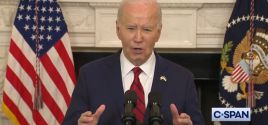Return to private sector means a microchip for Tommy ThompsonJournal Times OnlineAug. 16, 2005 |
Popular 
Claim Jewish Student Was 'Stabbed In The Eye' by Pro-Palestine Protester Draws Mockery After Video Released

Senate Passes $95B Giveaway to Israel, Ukraine, and Taiwan, Combined With TikTok Ban

Biden Signs Bill to Give $95B to Israel, Ukraine and Taiwan, Ban TikTok

Mistrial Declared in Case of Arizona Rancher Accused of Killing Migrant Trespasser

Sen. Hawley: Send National Guard to Crush Pro-Palestine Protests Like 'Eisenhower Sent the 101st to Little Rock'
 MADISON - Why would Tommy Thompson want to get a microchip implant? That just doesn't seem natural for a former Republican Wisconsin governor. I think of Wisconsin Republicans as a rather conservative lot, especially when it comes to messing with their bodies. I can't imagine, for example, gubernatorial candidates Mark Green or Scott Walker showing up at a press conference sporting new tattoos or body piercings. I think it's safe to conclude Thompson won't be a last-minute entry in that race. Some ultra-conservative Christians think microchip implants are the "sign of the beast" referred to in the Bible. It's hard to say for sure what is motivating Thompson to "get chipped," but a look below the surface may offer some clues. The former secretary of the U.S. Department of Health and Human Services has joined the board of directors for several companies, including VeriChip Corp., which makes an implantable chip about the size of a grain of rice. It's clear why VeriChip wants Thompson. He's a mover and shaker from the Bush administration. As secretary, Thompson helped shape the country's homeland security initiatives, such as preparing for biological or biochemical attack. Back home, he's still considered a "regular guy." A VeriChip typically is injected just under the surface of the skin, near the tricep of the right arm. When activated, the device emits a radio-frequency identification (RFID) signal that can be picked up by a special scanner. The concept is similar to RFID tags, which are used to track products, packages and shipments. In humans, the technology has both medical and security applications. In a medical emergency, the device can link a patient to medical records, even if the patient is incapacitated. The chip emits a code that authorized users can use to access medical records. To date, just five hospitals, all located in or near Boston and Washington, D.C., have agreed to use the technology, however. That means if Thompson needs emergency medical attention near those cities, he's in good shape. But if he's in Elroy when something happens, the implant would be about as useful as a cell phone at the North Pole. VeriChip also advertises a variety of security applications that theoretically could make sense for Thompson. The technology can be used to grant or deny access to buildings and secure areas, and has "real-time location and tracking capabilities," according to the company's Web site. I'm not sure how practical that is for Thompson, unless the feds want him back as a consultant during a public health emergency. Perhaps he'll need it to get into a VeriChip board meeting. Another possible interest in VeriChip may stem from Thompson's other business activities since leaving government. He also serves as president of La Crosse-based Logistics Health Inc., which has ambitions of expanding business with the military and Homeland Security. Among other things, Logistics Health provides "medical readiness solutions" for the U.S. military reserves, according to its Web site. It's homeland security unit "provides disaster response training services and vaccination scheduling, management and delivery, including the coordination and networking of critical disease information to thousands of healthcare providers across the country." Boiled down, I'm not exactly sure what that press-release lingo means. But if things really work out, it sounds like the former governor could become a key link between two companies with big ambitions. Maybe this microchip implant does make sense for Thompson. On the other hand, this could just be a former Republican governor having some fun without having to worry about what everyone else thinks. |



